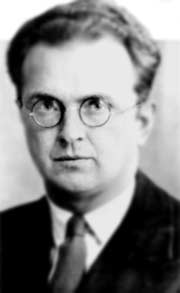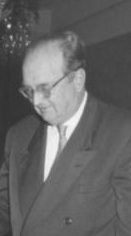ポール・キルヒホフ
Paul Kirchhoff, 1900-1972


ポール・キルヒホフ
Paul Kirchhoff, 1900-1972


★ここに概要を書く(→★
いるか08モダン)(→★源ちゃん08モダン)
| Paul Kirchhoff (*
17. August 1900 in Hörste; † 9. Dezember 1972 in Mexiko-Stadt),
Pseudonym Eiffel, war ein deutscher Philosoph, Anthropologe und
kommunistischer Aktivist. |
ポール・キルヒホフ(Paul Kirchhoff, *
1900年8月17日 in Hörste, † 1972年12月9日 in Mexico
City)は、ドイツの哲学者、人類学者、共産主義活動家。 |
| Leben Paul Kirchhoff studierte evangelische Theologie und Religion an der Friedrich-Wilhelms-Universität in Berlin sowie an der Albert-Ludwigs-Universität Freiburg. In Leipzig studierte er Psychologie und spezialisierte sich dort auf mexikanische Ethnologie[1], dort promovierte er 1927[2] mit Auszeichnung.[3] Kirchhoff gehörte 1920 zu den Gründungsmitgliedern der Kommunistischen Arbeiterpartei Deutschlands (KAPD). In dieser und in der ihr nahestehenden Betriebsorganisation AAUD war er bis 1931 aktiv. Im gleichen Jahr emigrierte er, nachdem ihm aus politischen Gründen ein Visum für einen Forschungsaufenthalt in Südafrika verweigert worden war,[4] in die Vereinigten Staaten von Amerika. Dort engagierte er sich bis 1934 in einer Exilgruppe der trotzkistischen Internationalen Kommunisten Deutschlands (IKD) und danach auf Grund seiner Ablehnung der von Leo Trotzki propagierten Politik des Entrismus in der Revolutionary Workers League (RWL) um Hugo Oehler. In beiden Organisationen gehörte Kirchhoff der Leitung an. Ende 1936 wurde Kirchhoff aus den USA ausgewiesen und flüchtete nach Mexiko, wo er 1937 die linkskommunistische Grupo de Trabajadores Marxistas (GTM) und deren Zeitschrift Comunismo mit ins Leben rief, welche nur wenige Jahre Bestand hatten.[5] Aus politischen Gründen verlor Kirchhoff die deutsche Staatsbürgerschaft und erhielt 1941 die mexikanische Staatsbürgerschaft.[2] 1938 war er der Mitbegründer der Nationalen Schule für Anthropologie und Geschichte in Mexiko-Stadt.[6] Er forschte an der Universidad Nacional Autónoma de México in Mexiko-Stadt, wo er bedeutende Forschungsergebnisse über die mexikanischen Kulturen hervorbrachte. 1943 führte Kirchhoff den Begriff Mesoamerika für die Klassifizierung ethnographischer Phänomene im mexikanisch-mittelamerikanischen Raum ein und vereinheitlichte damit einen vielfältigen und dynamischen Kulturraum nach dem „Cultural-Area“-Konzept der US-amerikanischen cultural anthropology. Als Verfechter des Diffusionismus war Kirchhoff – ähnlich wie Robert von Heine-Geldern und Gordon F. Ekholm – bemüht, anhand von Vergleichen asiatischer und amerikanischer Kulturerscheinungen wie Kunststile, Kunstmotive, Kalender und polytheistische Vorstellungssysteme den indirekten Nachweis zu führen, dass sich die Kulturen Amerikas unter Einfluss und im Kontakt mit den Hochkulturen der Alten Welt entwickelt haben.[7] |
生活 パウル・キルヒホフは、ベルリンのフリードリヒ・ヴィルヘルム大学とフライブルクのアルベルト・ルートヴィヒ大学でプロテスタントの神学と宗教を学んだ。 ライプチヒで心理学を学び、メキシコの民族学を専門とし[1]、1927年に優秀な成績で博士号を取得した[2]。キルヒホフは1920年にドイツ共産党 労働者党(KAPD)の創立メンバーの一人だった[3]。彼は、1931年までこの活動や、それに近い会社組織であるAAUDで活躍した。同年、政治的な 理由で南アフリカでの研究滞在のビザを拒否され、アメリカ合衆国に移住した[4]。そこで彼は、1934年までトロツキストであるドイツ国際共産主義者 (IKD)の亡命グループに参加し、その後、レオン・トロツキーが宣伝したエントリズムの政治を拒否したため、フーゴ・オーラー周辺の革命的労働者連盟 (RWL)に参加した。キルヒホッフは、両組織のリーダー格の一員であった。1936年末、キルヒホフはアメリカから追放され、メキシコに逃亡し、 1937年には左翼共産主義者Grupo de Trabajadores Marxistas(GTM)とその雑誌Comunismoの設立に協力したが、これは数年しか持たなかった[5]。政治的理由でキルヒホフはドイツ国籍 を失い、1941年にメキシコ国籍を取得した[2]。 1938年、メキシコシティに国立人類学歴史学派を設立[6]。メキシコシティのメキシコ国立自治大学で研究を行い、メキシコの文化について重要な研究成果を上げた。 1943年、キルヒホフはメキシコ-中米地域の民族学的現象を分類するためにメソアメリカという用語を導入し、米国の文化人類学の「文化圏」概念に従って、多様でダイナミックな文化圏を統一した。 拡散主義の提唱者であるキルヒホフは、ロバート・フォン・ハイネ=ゲルダーンやゴードン・F・エクホルムと同様に、芸術様式、芸術モチーフ、暦、多神教の 想像体系などのアジアとアメリカの文化現象の比較を用いて、アメリカの文化が旧世界の先進文化の影響下で、接触して発展したことを間接的に証明しようと試 みたのである[7]。 |
| Literatur Gérald Gaillard (Hrsg.), Peter James Bowman (Übersetzung): Kirchhoff, Paul (1900–1972), In: The Routledge Dictionary of Anthropologists, Routledge, London/New York, 2004, ISBN 0-415-22825-5, S. 224 (englisch, PDF online auf univpgri-palembang.ac.id); Dictionnaire des ethnologues et des anthropologues, Armand Colin, Paris 1997 (französisch) David Carrasco (Hrsg.): Kirchhoff, Paul (1900–1972) anthropologist. In: The Oxford Encyclopedia of Mesoamerican Cultures. Oxford University Press, 2006, ISBN 978-0-19510815-6 (eingeschränkter Online-Zugriff) Frauke Johanna Reisse: Paul Kirchhoff (1900–1972). In: Christopher Winters (Hrsg.): International Dictionary of Anthropologists. Garland, New York 1991, S. 348–349, ISBN 0-8240-5094-0, OCLC 23462648 Kirchhoff, Paul, in: Werner Röder; Herbert A. Strauss (Hrsg.): International Biographical Dictionary of Central European Emigrés 1933–1945. Band 2,1. München : Saur, 1983, S. 621 |
|
| https://de.wikipedia.org/wiki/Paul_Kirchhoff |
|
| Ethnologist,
Americanist. Born in Hörste, Westphalia (Germany) 17 August 1900, died
Mexico City (Mexico) 9 December 1972. Kirchhoff studied evangelical
theology and religion in Berlin and Freiburg i. Br., and psychology and
ethnology in Leipzig, where he also developed an interest in the native
cultures of the Americas. In 1927, he completed his studies with a
doctoral dissertation on the kinship organization of the South American
Indians. In his dissertation, Kirchhoff developed typologies of kinship
terminologies which preced those of George Peter Murdock [1897-1985]
and are different from those developed at about the same time by Robert
H. Lowie [1883-1957]. Until 1929 Kirchhoff served as a staff member of
the Berlin Museum für Völkerkunde. In addition, he collaborated on
different international research projects overseas. In 1939, Kirchhoff was deprived of his German citizenship for political reasons, becoming a Mexican citizen in 1941. In Mexico he was employed at first by the Museo Nacional de Antropología and became in 1955 one of the co-founders of the Escuela Nacional de Antropología e Historia, which developped into the leading training center for anthropologists in Mexico. Kirchhoff was employed there until 1965 and at the same time held a professorship in the graduate division of anthropology at the Universidad Nacional Autónoma de México. As a visiting lecturer, Kirchhoff lectured in 1960 and 1967 at the universities of Bonn, Heidelberg and Frankfurt am Main in Germany. 1963 saw the culmination of Kirchhoff's efforts to create scientific cooperation between Germany and Mexico in the founding of the interdisciplinary Puebla-Tlaxcala Project, sponsored bei the „Deutsche Forschungsgemeinschaft“, which lasted for more than twenty years, whose patron he had become and which was training ground for many anthropologists and archaeologists, among them Ursula Dyckerhoff [1930-2004], Peter Tschohl [1935-2007], Wolfgang Marschall [born 1937], Klaus Jäcklein [ born 1940], and Hanns J. Prem [born 1941]. Of the great number and diversity of Kirchhoff's researches, those on the Indians of North and South America and his archaeological and ethno-historical work on the little considered northern and northwestern regions of Mexico must be emphasized. His most influential contribution to research on the Americas is the creation of the culture-area concept of "Mesoamerica", wherein he was later challenged by Mexican born scholar Wigberto Jiménez Moreno [1909-1985], who purported to have developped the concept earlier, albeit he had not published it. The Mesoamerican culture area encompasses Indian civilizations of the contiguous zone covering the central and southern portions of Mexico, the adjoining countries Guatemala, El Salvador, and Belize in their entirety, the northwestern section of Honduras and the northern Pacific coast of Nicaragua. Kirchhoff defined this region as a culture area whose historical growth was interrelated, based upon common cultural characteristics such as ball courts, hieroglyphic writing and stepped pyramids. (Text by courtesy of Berthold Riese; photo by courtesy of Siegfried Seyfarth) |
民
族学者、アメリカ主義者。1900年8月17日ヴェストファーレン州ヘルステ(ドイツ)生まれ、1972年12月9日メキシコシティ(メキシコ)死去。ベ
ルリンとフライブルクで福音主義神学と宗教学を、ライプツィヒで心理学と民族学を学び、アメリカ大陸の先住民文化に関心を抱くようになる。1927年、南
米インディアンの血縁組織に関する博士論文を発表し、学業を終えた。この論文でキルヒホフは、ジョージ・ピーター・マードック [1897-1985]
のものに先行し、ほぼ同時期にロバート・H・ローウィー [1883-1957]
が開発したものとは異なる親族関係の用語の類型を開発した。1929年まで、キルヒホッフはベルリン造形学博物館のスタッフとして働いていた。また、海外
ではさまざまな国際研究プロジェクトに協力した。1939年。 1939年、キルヒホッフは政治的な理由でドイツ国籍を剥奪され、1941年にメキシコ国籍を取得した。メキシコでは、国立人類学博物館(Museo Nacional de Antropología)に勤務した後、1955年に国立人類学歴史学院(Escuela Nacional de Antropología e Historia)の共同創設者のひとりとなった。キルヒホフは1965年まで同校に勤務し、同時にメキシコ国立自治大学の人類学大学院の教授に就任し た。 1960年と1967年には、ドイツのボン大学、ハイデルベルク大学、フランクフルト大学で客員教授として講義をした。1963年、キルヒホフは、ドイツ とメキシコの学術的な協力関係を構築するために、20年以上続いた「プエブラ・トゥラクカラ・プロジェクト」を立ち上げた。このプロジェクトは、彼の後援 を得て、ウルスラ・ディッカーホフ(1930-2004)、ペーター・ツコール(1935-2007)、ヴォルフガング・マーシャル(1937年生)、ク ラウス・ジャクライン(1940年生)、ハンス・J・プレム(1941年生)などの人類学者や考古学者のトレーニング場となるものだった。 キルヒホフの研究は多岐にわたるが、なかでも南北アメリカのインディアンに関する研究と、メキシコ北部・北西部の考古学・民族史的研究は特筆されるもので ある。彼のアメリカ大陸研究への最も大きな貢献は、「メソアメリカ」という文化圏の概念の創出であるが、後にメキシコ生まれの学者ウィグベルト・ヒメネ ス・モレノ(1909-1985)が、発表はしていないものの、その概念を先に構築していたと主張し、異議を唱えた。メソアメリカ文化圏とは、メキシコの 中南部、隣接するグアテマラ、エルサルバドル、ベリーズの全域、ホンジュラスの北西部、ニカラグアの北部太平洋岸を含む連続した地帯のインド文明のことで ある。キルヒホッフはこの地域を、球技場、象形文字、階段ピラミッドなどの共通の文化的特徴をもとに、歴史的な成長が相互に関連しあった文化圏と定義して いる。 (文:Berthold Riese、写真:Siegfried Seyfarth提供) |
| http://www.germananthropology.com/short-portrait/paul-kirchhoff/185 |
|
+++
Links
リンク
文献
その他の情報


